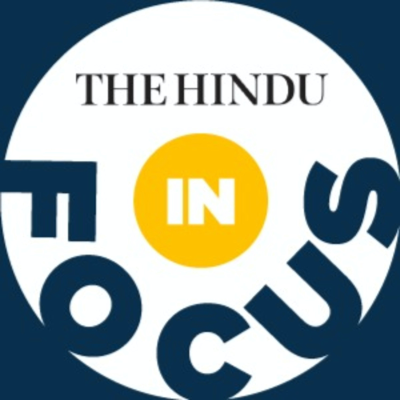
In Focus by The Hindu
Podcast de The Hindu
Empieza 7 días de prueba
$99 / mes después de la prueba.Cancela cuando quieras.

Más de 1 millón de oyentes
Podimo te va a encantar, y no estás solo/a
Valorado con 4,7 en la App Store
Acerca de In Focus by The Hindu
A podcast from The Hindu that delves deep into current developments with subject experts, and brings in context, history, perspective and analysis.
Todos los episodios
1068 episodiosIndia’s rocks hold an extraordinary record of life: the earliest traces of plants, dinosaur bones, and even fossils of ancient horses, whales, and humans. This wealth comes from the subcontinent’s geological journey after it broke away from the supercontinent Gondwanaland and later its collision with Asia that formed the Himalayas. Yet today, fossils face mounting threats: theft, commercial trade, and the absence of strong legal safeguards. In this weekender episode, we explore how India became such a rich ground for fossils, why these discoveries matter for both our past and our future, and what it will take to preserve them. Guest: Professor Ashok Sahni, one of India’s most distinguished palaeontologists, whose discoveries have reshaped our understanding of India’s ancient world. Host: Anupama Chandrasekaran Edited by Jude Francis Weston Learn more about your ad choices. Visit megaphone.fm/adchoices [https://megaphone.fm/adchoices]
On Saturday morning, a 45-year-old man died in Kerala of amoebic meningocephalitis. This is the fourth death reported in Kerala in less than a month of this rare but deadly infection, colloquially known as brain-eating amoeba. This year alone, over 40 cases have been reported in the State, with 11 people undergoing treatment in hospitals at present. The Health Department has invoked the Kerala Public Health Act to launch preventive and control measures, as it emerges that perhaps all waterbodies — wells, ponds, canals, swimming pools, water theme parks — could be a potential source of amoebic infection for people using them, unless these are regularly cleaned and maintained in good condition. What is this brain-eating amoeba? Why is a rare infection being seen in dozens of people across one Southern state? How is it diagnosed and treated? And how can water be used safely? Guest: Dr Aravind Reghukumar, Head of department of infectious diseases, Government Medical College Thiruvananthapuram, Kerala Convenor of Kerala State Medical Board Host: Zubeda Hamid Edited by Sharmada Venkatasubramanian Learn more about your ad choices. Visit megaphone.fm/adchoices [https://megaphone.fm/adchoices]
For years, the United States let low-value parcels enter duty-free under a rule called the de minimis exemption—literally “too small to matter.” By 2016, the limit had risen to $800, among the highest in the world, opening doors for Indian exporters to sell cheaply to American buyers. Now that rule is gone. The U.S. says it was abused, hurting local businesses and even enabling shipments to make synthetic drugs. With India’s government-run postal system halting most parcels, what was once too small to matter is now a big question for India’s small businesses: how will they cope? Guest: Movin Jain Host: Anupama Chandrasekaran Edited and produced by Sharmada Venkatasubramanian Learn more about your ad choices. Visit megaphone.fm/adchoices [https://megaphone.fm/adchoices]
On August 25, 2025, the Supreme Court urged the Union government to frame guidelines for regulating social media, noting that influencers often commercialise free speech in ways that may offend the sentiments of vulnerable groups. A Bench of Justices Surya Kant and Joymalya Bagchi directed that these regulations be drafted in consultation with the National Broadcasters and Digital Association. The order stemmed from an intervention application filed by a non-profit representing persons with Spinal Muscular Atrophy, which alleged that comedians Samay Raina, Vipul Goyal, Balraj Paramjeet Singh Ghai, Sonali Thakkar, and Nishant Jagdish Tanwar had made derogatory remarks about those living with the disorder. Should commercial speech on digital platforms be regulated? Here we discuss the question. Guests: Apar Gupta and Jay Vinayak Ojha Host: Aaratrika Bhaumik. Edited by Jude Francis Weston Learn more about your ad choices. Visit megaphone.fm/adchoices [https://megaphone.fm/adchoices]
Parliament last month enacted the Promotion and Regulation of Online Gaming Bill, 2025, establishing a comprehensive legal framework for India’s rapidly expanding online gaming sector. The legislation, which received the President’s assent on August 22, seeks to regulate segments such as e-sports and social gaming, while simultaneously imposing a blanket prohibition on all money-based online games. The stated rationale for this prohibition is the “serious social, financial, psychological and public health harms, particularly among young individuals and economically disadvantaged groups,” associated with real-money gaming. Even before the law has taken effect, several petitions have been filed in the Karnataka High Court challenging its validity. The Court has issued notice to the Union government on an interim plea seeking a stay on the Act’s application to online games of skill. Can the new legislation withstand constitutional scrutiny? What are its broader implications? Does it run contrary to established judicial precedents that distinguish between games of skill and games of chance? Note: This episode was recorded before petitions challenging the law were filed in the Karnataka HC. Guest: Deepak Joshi, Advocate-On-Record at the Supreme Court of India Host: Aaratrika Bhaumik Shot, produced, and edited by Jude Francis Weston Learn more about your ad choices. Visit megaphone.fm/adchoices [https://megaphone.fm/adchoices]

Valorado con 4,7 en la App Store
Empieza 7 días de prueba
$99 / mes después de la prueba.Cancela cuando quieras.
Podcasts exclusivos
Sin anuncios
Podcast gratuitos
Audiolibros
20 horas / mes























